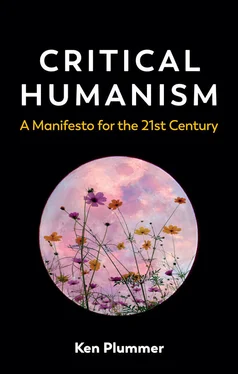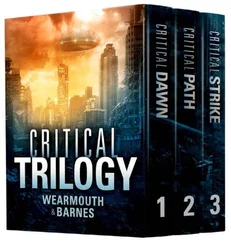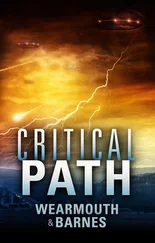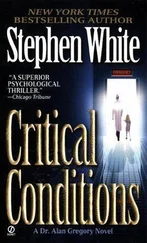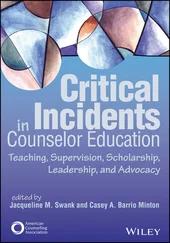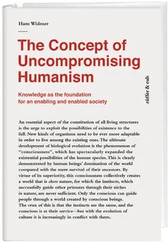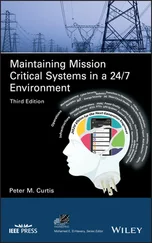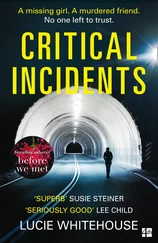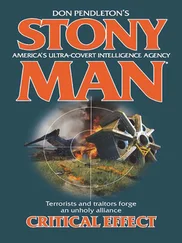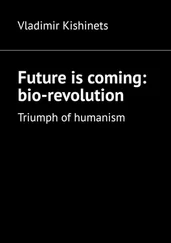6 6 Anne Phillips, The Politics of the Human (Cambridge University Press, 2015), pp. 14–15.
7 7 As well as the discussion in Phillips’s Politics of the Human, see discussions in Yuval Noah Harari, Sapiens: A Brief History of Humankind (Vintage, 2011) and Homo Deus: A Brief History of Tomorrow (Vintage Books, 2015); Siep Stuurman, The Invention of Humanity: Equality and Cultural Difference in World History (Harvard University Press, 2017); Alexander Harcourt, Humankind: How Biology and Geography Shape Human Diversity (Pegasus, 2015); John Hands, Cosmo Sapiens: Human Evolution from the Origin of the Universe (Duckworth, 2015); and Bruce Mazlish, The Idea of Humanity in a Global Era (Palgrave Macmillan, 2009).
8 8 Trees account for some 82 per cent of biomass; tiny bacteria some 13 per cent; we humans account for a mere 0.01 per cent. For a summary of these ideas, see https://www.theguardian.com/environment/2018/may/21/human-race-just-001-of-all-life-but-has-destroyed-over-80-of-wild-mammals-study. The original study can be found at: Yinon M. Bar-On, Rob Phillips and Ron Milo, ‘The Biomass Distribution on Earth’, Proceedings of the National Academy of Sciences, 115/25 (19 June 2018): 6506–11: https://www.pnas.org/content/115/25/6506/tab-article-info.
9 9 Discussions of the ‘person’ raise many issues – especially concerning dignity and agency. It corresponds roughly to what I will refer to as existential being, but I do not discuss it here. An important clarification is to be found in Christian Smith, What Is a Person? Rethinking Humanity, Social Life, and the Moral Good from the Person Up (University of Chicago Press, 2011). See also Margaret Archer, Being Human: The Problem of Agency (Cambridge University Press, 2000).
Part I Rethinking the World: Connecting Humanity
Critical humanism:
a narrative that provides changing, connective, critical and contested stories of how we become human in the universe;
a dialogue between contrasting and contested meanings about what it is to be human in the universe;
a project that aims to repair the damaged world and cultivate its flourishing;
a connection between life and earth, people and communities, societies and the world: and the cosmos beyond;
an imagination that thinks like a planet, ‘only connects’ and creates a generational hope;
an imaginary that builds grounded projects for a better world for all;
a politics of humanity that works for positive transformations of the world in a multitude of ways;
a theory to make sense of all the above.
The status of human is something we claim and enact rather than something we uncover.
Anne Phillips, The Politics of the Human (2015), p. 131
Humanism and humanity have fallen on hard times. They need to be reimagined and reconnected. As Anne Phillips points out, our human status must be enacted, not simply discovered. Three or four generations ago, their death was being firmly announced by European philosophers. 1More recently, a posthuman era has been ushered in. This ‘ending’ of humanism happens periodically; the sociologist Marcus Morgan nicely calls it ‘the phoenix of humanism’. 2Humanism has its fates, fatalities and foes; yet it rises back up again and again. Humanity seems to keep calling us. At its best, as John Dewey once remarked, it is ‘an expansion, not a contraction, of human life, an expansion in which nature and the science of nature are made the willing servants of human good’. 3Each generation finds its new responses. This book is one such response.
Critical Humanism as a Project
Critical humanism suggests a fallible, worldwide, contested narrative about the collective, connecting and changing ways of being ‘human’. Just what this ‘human’ signifies is itself a long tale: of searching for the meanings of vulnerable life in a precarious plural world. The very idea of ‘humanity’ becomes a debated and contested one.
Critical humanism becomes a project shaped by many controversies. It highlights the plurality of our lives and humanisms, the connectivity and contingency of life and the narrativity of humanity. It argues for a humanism that is truly worldwide and not just an argument for some narrow, culture-bound version. It can learn from a wide range of different humanisms that have existed. And all this leads to the thorny problem of universalism and essentialism, a problem that haunts all discussions of humanism. As such, it is clear that a deep tension arises between the various claims for the generalities of a universal humanity in a world where lives are also and always lived in context-specific particularities , a ‘radical contextuality’. 4
Critical humanism, then, is an open project not a closed theory. It is an ever-changing endeavour to rethink and remake a narrative of a world humanity. Different groups have struggled throughout history over just what it means to be a human being in a fragile universe. The task now is to connect: to imagine ‘like a world’ and build a rich planetary agenda of diverse and multiple critical projects that bring us together to re-create a better world for all. Box 1.1sets out the basic agenda, which is then pursued in the rest of the book. By the final chapter, it will have somehow transformed itself into a political manifesto.
Humanist Sociology and Critical Humanism
To be clear at the outset, critical humanism is not new. It draws on a range of past humanisms, especially a flexible humanist sociology, but takes it further. A humanist sociology is one that builds on pragmatism. It recognizes and appreciates the value of every grounded, down-to-earth and uniquely different active human life. It listens to their stories and search for meaning. It appreciates the significance of their vulnerability, suffering and joy in life; aims at building a sympathetic human knowledge; connects to wider structural, historical issues; provides a conversation about human values; suggests transformations that aim to make better worlds; and confronts an emancipatory politics head on. 5It has many kindred spirits. 6Nowadays, this has to be a global argument not a local one: after all, although Bangladesh, Brazil, China, India, Indonesia, Mexico, Nigeria, Pakistan and Russia rank as the largest and most populated countries in the world, they typically get little mention in the many works on humanism. It is part of the movement to de-Westernize, decolonize and repolarize the world. A new and important idea here is that of the pluriversal world: there are many ‘worlds of worlds’ living alongside one another. Ours is a plural world. 7
Box 1.1: Connecting humanity: the critical humanist project
Critical humanism suggests an opening eight-point agenda to get us going. I explore all these in the chapters that follow.
1 Critical humanism What is this thing called ‘critical humanism’? Why do we need it? Where is it heading? What are its challenges?
2 Damaged humanity How have we come to construct such a mutilated, disconnected world? How might we repair it?
3 Divided humanity Why is humanity so divided? How can we learn to live well together with our amazing and vast array of differences?
4 Traumatized humanity How can we make sense of the atrocities of our past? Why have we treated each other so badly and with such cruelty? How can we build narratives and institutions of reconciliation, justice, truth and accountability with one another?
5 Narrative humanity How has humanity been assembled through narrative? We have become the distinctive, even distinguished, storytelling animal. So how can we cultivate stories that will encourage a better future, a flourishing world? Can there be a narrative of worldwide connection?
Читать дальше
